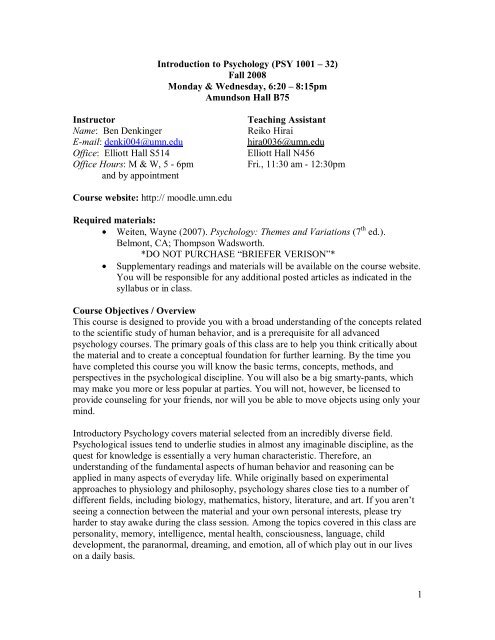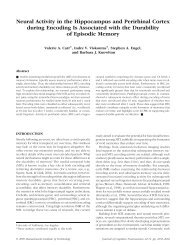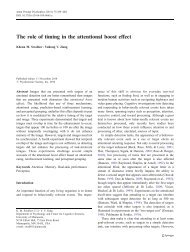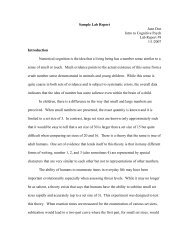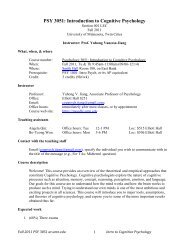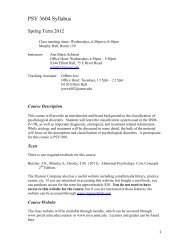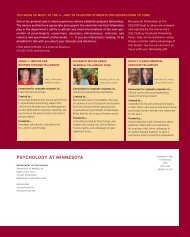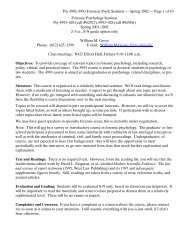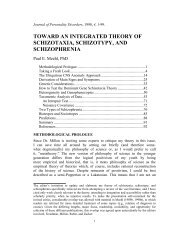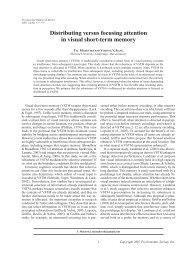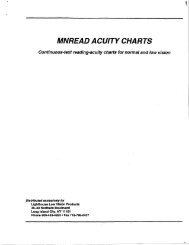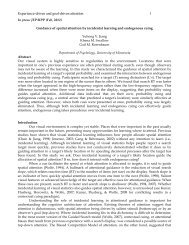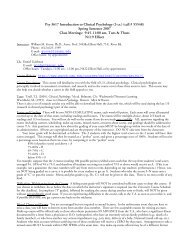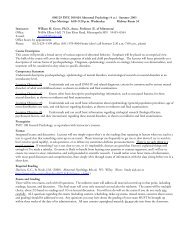1 Introduction to Psychology (PSY 1001 â 32) - Department of ...
1 Introduction to Psychology (PSY 1001 â 32) - Department of ...
1 Introduction to Psychology (PSY 1001 â 32) - Department of ...
Create successful ePaper yourself
Turn your PDF publications into a flip-book with our unique Google optimized e-Paper software.
<strong>Introduction</strong> <strong>to</strong> <strong>Psychology</strong> (<strong>PSY</strong> <strong>1001</strong> – <strong>32</strong>)Fall 2008Monday & Wednesday, 6:20 – 8:15pmAmundson Hall B75Instruc<strong>to</strong>rName: Ben DenkingerE-mail: denki004@umn.eduOffice: Elliott Hall S514Office Hours: M & W, 5 - 6pmand by appointmentTeaching AssistantReiko Hiraihira0036@umn.eduElliott Hall N456Fri., 11:30 am - 12:30pmCourse website: http:// moodle.umn.eduRequired materials:• Weiten, Wayne (2007). <strong>Psychology</strong>: Themes and Variations (7 th ed.).Belmont, CA; Thompson Wadsworth.*DO NOT PURCHASE “BRIEFER VERISON”*• Supplementary readings and materials will be available on the course website.You will be responsible for any additional posted articles as indicated in thesyllabus or in class.Course Objectives / OverviewThis course is designed <strong>to</strong> provide you with a broad understanding <strong>of</strong> the concepts related<strong>to</strong> the scientific study <strong>of</strong> human behavior, and is a prerequisite for all advancedpsychology courses. The primary goals <strong>of</strong> this class are <strong>to</strong> help you think critically aboutthe material and <strong>to</strong> create a conceptual foundation for further learning. By the time youhave completed this course you will know the basic terms, concepts, methods, andperspectives in the psychological discipline. You will also be a big smarty-pants, whichmay make you more or less popular at parties. You will not, however, be licensed <strong>to</strong>provide counseling for your friends, nor will you be able <strong>to</strong> move objects using only yourmind.Introduc<strong>to</strong>ry <strong>Psychology</strong> covers material selected from an incredibly diverse field.Psychological issues tend <strong>to</strong> underlie studies in almost any imaginable discipline, as thequest for knowledge is essentially a very human characteristic. Therefore, anunderstanding <strong>of</strong> the fundamental aspects <strong>of</strong> human behavior and reasoning can beapplied in many aspects <strong>of</strong> everyday life. While originally based on experimentalapproaches <strong>to</strong> physiology and philosophy, psychology shares close ties <strong>to</strong> a number <strong>of</strong>different fields, including biology, mathematics, his<strong>to</strong>ry, literature, and art. If you aren’tseeing a connection between the material and your own personal interests, please tryharder <strong>to</strong> stay awake during the class session. Among the <strong>to</strong>pics covered in this class arepersonality, memory, intelligence, mental health, consciousness, language, childdevelopment, the paranormal, dreaming, and emotion, all <strong>of</strong> which play out in our liveson a daily basis.1
Lectures and attendance policyClasses will consist <strong>of</strong> a variety <strong>of</strong> activities, including group work, film clips,demonstrations, and lectures. You will be responsible for all material covered in thecourse, regardless <strong>of</strong> your attendance. If you miss class, you are responsible for gettingnotes from a classmate. Lecture slides will be available on the course website at least 24hours before the class in which the material is taught. You are welcome <strong>to</strong> print thesematerials and bring them <strong>to</strong> class, but they will not be passed out during class itself due <strong>to</strong>the enormous amount <strong>of</strong> paper that would require. The posted slides will NOT contain allthe material covered in lecture, as I wouldn’t want <strong>to</strong> spoil any <strong>of</strong> my jokes by giving youthe punch line in advance. Only the most essential (and note-taking intensive) materialwill be included in the lecture slides.While class attendance is not required, writing assignments will make up about 20% <strong>of</strong>your overall grade for the course (see writing assignments below), and must be submittedduring class time for full credit. Additionally, lectures will cover material from the bookin greater depth, and may include subjects that are not discussed in detail in the text.Writing assignments (45 points)Each Wednesday you will be provided an essay <strong>to</strong>pic <strong>to</strong> prepare for the followingMonday (see the class schedule for specific due dates). This essay will require you <strong>to</strong>think critically about a <strong>to</strong>pic discussed in class or in the text, and but doesn’t requiremuch factual support or references. Instead, I would like <strong>to</strong> provide you an opportunity <strong>to</strong>share your own thoughts about the important issues that psychologists must consider.Essays are worth 5 points each, and you will always be provided almost 5 days <strong>to</strong> preparethis 1-2 page essay (no more, no less!). While this is an opinion-based assignment, Iexpect that it is pro<strong>of</strong>read and grammatically correct. There is no reason why you shouldnot be able <strong>to</strong> gain all 5 points on each essay assignment should you take the time <strong>to</strong>carefully check your work. There will be a <strong>to</strong>tal <strong>of</strong> 9 essays assigned during the semester,and they comprise about 20% <strong>of</strong> your final grade. Essays will be collected at thebeginning <strong>of</strong> class on Monday.If you are unable <strong>to</strong> make it <strong>to</strong> class on a Monday in which an essay is due, you maycontact me in advance or have a friend bring your essay along <strong>to</strong> class. Any essaysubmitted via e-mail, regardless <strong>of</strong> the reason, is subject <strong>to</strong> a -2 point deduction fromyour score for that assignment.Research report and experimental design project(40 points [30 – report, 10 – design])A portion <strong>of</strong> your grade for this course will be based on an experimental design project inwhich you choose one <strong>of</strong> five papers <strong>to</strong> review and design an experiment <strong>to</strong> test ahypothesis based on this issue. The first part <strong>of</strong> this assignment will consist <strong>of</strong> reading aresearch report and filling out a worksheet <strong>to</strong> summarize their findings, and describe themethods they used (30 points). For the second part you will be responsible for describingyour own experiment based on the study you read (10 points). Specific requirements arelisted on a separate handout, which is also available online. You are expected <strong>to</strong> work2
independently on this assignment, and this project must be submitted at the beginning <strong>of</strong>class on November 12th.ExaminationsA <strong>to</strong>tal <strong>of</strong> 4 exams will be given throughout the semester, including the final. Theseexams will include questions based on readings from the text, supplementary materials,and lectures. Examinations will consist <strong>of</strong> multiple choice and short essay questions.Review materials will be available online in the week preceding the exam. Each <strong>of</strong> thethree exams given during regular semester will cover only the newest material, while thefinal will contain both new material and some cumulative material from earlier in thesemester. Study guides and learning objectives will be made available via the coursewebsite at least one week in advance <strong>of</strong> each test.Missed examsInstead <strong>of</strong> a missed exam policy, in this course your lowest test score is dropped and yourfinal grade only includes your best 3 test scores. If you choose <strong>to</strong> do so, you are allowed<strong>to</strong> miss one <strong>of</strong> the 4 exams, as you can receive a 0 on one test with no penalty <strong>to</strong> yourfinal grade. However, keep in mind that it is <strong>to</strong> your benefit <strong>to</strong> take each test. NO MAKE-UP EXAMS WILL BE GIVEN, so plan carefully. As an added bonus, if you are satisfiedwith your grade at the end <strong>of</strong> the semester and have taken the first three tests you mayskip the final exam.Summary <strong>of</strong> gradesEssay assignments (9 required)Research report projectExam IExam IIExam IIIFinal45 points40 points55 points55 points55 points55 pointsTotal 305 points- lowest test scoreStudent ConductA number <strong>of</strong> the issues covered in this course are the source <strong>of</strong> intense debate, and mayelicit some strong emotional reactions. While I enjoy a great debate, I expect all <strong>of</strong> you <strong>to</strong>be respectful <strong>of</strong> the opinions <strong>of</strong> others regardless <strong>of</strong> the strength <strong>of</strong> your own beliefs.Every student has the right <strong>to</strong> a civil, productive, and stimulating learning environment,and as such, you are expected <strong>to</strong> abide by the College <strong>of</strong> Liberal arts student conductregulations. Accordingly, students whose behavior is disruptive <strong>to</strong> the instruc<strong>to</strong>r or otherstudents will be asked <strong>to</strong> leave the classroom. The full student code <strong>of</strong> conduct isavailable at http://advising<strong>to</strong>ols.class.umn.edu/cgep/studentconduct.htmlSexual harassment (defined as any unwelcome sexual advance, verbal or physicalconduct <strong>of</strong> a sexual nature) will not be <strong>to</strong>lerated, and complaints should be directed <strong>to</strong> theUniversity’s Office <strong>of</strong> Equal Opportunity and Affirmative Action (624-9547).3
Academic dishonestyStudents are expected <strong>to</strong> adhere <strong>to</strong> the university’s policy on academic dishonesty, asdefined by the Committee on Student Academic Affairs. Any misrepresentation <strong>of</strong> astudent’s own work will not be <strong>to</strong>lerated, including cheating on assignments or exams,plagiarizing, submitting the same paper or material for more than one course, or thewillful sabotage <strong>of</strong> another’s work. Students suspected <strong>of</strong> cheating on an exam, quiz, oressay will receive a 0 on that assignment and, in accord with University policy, furtheraction may be taken.Students with special needsThe University <strong>of</strong> Minnesota is committed <strong>to</strong> providing equal access <strong>to</strong> learning for all itsstudents. If you need any special accommodations, please contact me as soon as possible.Please remember that the <strong>of</strong>fice <strong>of</strong> disability services is at your disposal <strong>to</strong> aid you inyour studies, and can be contacted at (612) 626-1333. As an instruc<strong>to</strong>r, I am notauthorized <strong>to</strong> honor any request that has not been brought <strong>to</strong> the attention <strong>of</strong> this group. Ican assure you, however, that your confidentiality and success at learning are <strong>of</strong> utmostimportance <strong>to</strong> the <strong>of</strong>fice <strong>of</strong> disability services, and I strongly encourage that you seektheir aid, if necessary. Students with special needs or those for whom English is not theirnative language can arrange <strong>to</strong> be granted extra time on tests. While the use <strong>of</strong> foreignlanguage dictionaries and computers will not be permitted during exams, all students arepermitted <strong>to</strong> ask for help with words that are not technical psychological terms covered inthe course.Syllabus changesWhile the general structure <strong>of</strong> the assignments and the <strong>to</strong>pics covered each day shouldremain as indicated, some changes <strong>to</strong> the syllabus may occur during the semester. Youwill be informed <strong>of</strong> these changes in class, and updated syllabus information will beposted on the course website.GradingYou will be graded based on <strong>to</strong>tal points earned, not on performance in comparison <strong>to</strong>other students. Given that your grade is based on your own performance, there is noreason that every one <strong>of</strong> you cannot achieve an A grade in the course. Alternately, it isalso in your power <strong>to</strong> choose <strong>to</strong> earn an F. As you will learn in class, people tend <strong>to</strong>attribute their own behavior <strong>to</strong> others as a defense mechanism, and I’d rather you did wellin the class and didn’t waste your precious emotional energy on hating me for the rest <strong>of</strong>your natural lives. The grading scale is approximately as follows:4
Points Earned Percent Letter Grade250 – 2<strong>32</strong> 100% - 93% A231 – 225 92.9% - 90% A-224 – 217 89.9% - 87% B+216 – 207 86.9% - 83% B206 – 200 82.9% - 80% B-199 – 192 79.9% -77% C+191 – 182 76.9% - 73% C181 – 175 72.9% - 70% C-174 – 167 69.9% - 67% D+166 – 150 66.9% - 60% D149 - 0 59.9% and below FStudents registered for a S-N grade in the course must earn a minimum <strong>of</strong> 70% <strong>of</strong> thepoints <strong>to</strong> receive an S grade. Grades will be available at any time on request, but Iencourage you <strong>to</strong> keep track <strong>of</strong> your score using the worksheet provided below. If you areconcerned about any <strong>of</strong> the grades you have received, feel free <strong>to</strong> talk <strong>to</strong> me during <strong>of</strong>ficehours. The University <strong>of</strong> Minnesota has adopted the following definitions for lettergrades:Grade DefinitionAOutstanding achievement relative <strong>to</strong> the level necessary <strong>to</strong> meet courserequirementsBAchievement significantly above the level necessary <strong>to</strong> meet courserequirementsCAchievement that meets the course requirements in every respectDAchievement that is worthy <strong>of</strong> credit even though it fails <strong>to</strong> fully meet thecourse requirementsSAchievement that is satisfac<strong>to</strong>ry and is equivalent <strong>to</strong> a C- or betterF or N Represents failure (and no credit) and signifies that the work was either (1)completed but at a level <strong>of</strong> achievement that is not worthy <strong>of</strong> credit or (2)was not completed and there was no agreement between the instruc<strong>to</strong>r andthe student that the student should be awarded an I.IAssigned at the discretion <strong>of</strong> the instruc<strong>to</strong>r when, due <strong>to</strong> an extraordinarycircumstance (e.g. hospitalization) a student is prevented from completingthe work <strong>of</strong> the course on time. Requires a written agreement between theinstruc<strong>to</strong>r and the student.5
Extra credit & The Research Experience Program (REP)The Research Experience Program (REP) is a voluntary part <strong>of</strong> the <strong>1001</strong> course that givesyou an opportunity <strong>to</strong> gain extra credit through participation in research projectsconducted by members <strong>of</strong> the <strong>Department</strong> <strong>of</strong> <strong>Psychology</strong>. This program serves two mainpurposes: 1) <strong>to</strong> expose students <strong>to</strong> educational opportunities for learning aboutcontemporary research in psychology; and 2) <strong>to</strong> sustain the University <strong>of</strong> Minnesota’sextensive and internationally recognized research program by providing a source <strong>of</strong>research participants.Students may participate in as many research studies as they wish, and each is worth avarying number <strong>of</strong> extra credit points (typically 2 points / hour <strong>of</strong> participation).However, students may earn a maximum <strong>of</strong> 15 extra credit points throughout thesummer session. These points must be accumulated before Friday, December 5 th .For a list <strong>of</strong> eligible studies and further information, visit the REP website at:http://www.psych.umn.edu/research/rep/default.htmWhen you agree <strong>to</strong> take part in a research study, you are required <strong>to</strong> meet any scheduledobligations that you have made. Skipping a research session is an enormous waste <strong>of</strong> timeand resources, and is unfair <strong>to</strong> those that are trying <strong>to</strong> perform their research. For thisreason, skipping a research session will cost you a -1 point penalty <strong>to</strong> your grade for eachmissed session.REP study participationName <strong>of</strong> Study Researcher / Project Number Points earned6
WEEK DATE TOPIC ASSIGNMENTS BE PREPARED WITH1 3-Sep Welcome and <strong>Introduction</strong> none2345678910111213148-Sep Research Methods I pp. 48-6910-Sep Research Methods II pp. 37-4815-Sep Biological <strong>Psychology</strong> I Essay 1 pp. 73-<strong>1001</strong>7-Sep Biological <strong>Psychology</strong> II none22-Sep Genetics Essay 2 pp. 101-11524-Sep Sensation and Perception I pp. 119-14929-Sep Sensation and Perception II pp. 149-1691-Oct Mid-term I none6-Oct Learning I pp. 215-2378-Oct Learning II pp. 238-25513-Oct Development I Essay 3 pp. 417-4<strong>32</strong>15-Oct Development II pp. 433-44720-Oct Development III Essay 4 pp. 447-46522-Oct Memory I pp. 259-27627-Oct Memory II Essay 5 pp. 276-29529-Oct Mid-term II none3-Nov Language pp. 299-3095-Nov Intelligence pp. 335-36910-Nov Consciousness Essay 6 catch-up!12-Nov Sleep and Dreams *RRP DUE* pp. 174-19817-Nov Cognitive <strong>Psychology</strong> Essay 7 pp. 310-33119-Nov Social <strong>Psychology</strong> pp. 633-67124-Nov Mid-term III none26-Nov Personality pp. 469-5051-Dec Motivation Essay 8 pp. 375-3983-Dec Emotion pp. 398-4118-Dec Abnormal <strong>Psychology</strong> Essay 9 pp. 551-5891510-Dec Treatment pp. 199-211, 595-61516 15-Dec FINAL EXAM none7
Keeping track <strong>of</strong> your gradesYou may use the following table <strong>to</strong> keep track <strong>of</strong> your grade in this course.Assignment Date Due Points earned Points possibleEssay 1 15-Sep 5Essay 2 22-Sep 5EXAM I 1-Oct 55Essay 3 13-Oct 5Essay 4 20-Oct 5Essay 5 27-Oct 5EXAM II 29-Oct 55Essay 6 10-Nov 5RRP 12-Nov 40Essay 7 17-Nov 5EXAM III 24-Nov 55Essay 8 1-Dec 5Essay 9 8-Dec 5FINAL 15-Dec 55TOTAL 250**lowest test score isdropped8


